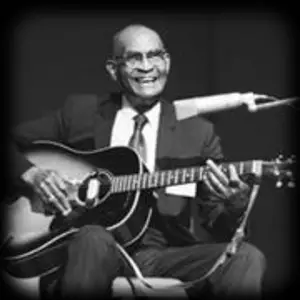Rev. ROBERT WILKINS
 Blues and Gospel music share a lot of common roots, and it is not unusual for performers to cross the line in both directions. The renowned Delta Bluesman Son House was a ‘Hellfire Preacher’ before the Devil’s music took his soul, and the Rev. Gary Davis belonged to a rollicking Blues scene in Atlanta before he ‘found the Lord’. Of course, some Blues legends like Blind Lemon Jefferson were not above putting out religious records under an alias (Deacon LJ Bates in that case) provided that the money was right. Another great singer and sensitive guitar stylist who crossed the line was Robert Wilkins, who carried the sound of the Delta and the originators of the Blues on to the 60s Festival generation as the Reverend Robert.
Blues and Gospel music share a lot of common roots, and it is not unusual for performers to cross the line in both directions. The renowned Delta Bluesman Son House was a ‘Hellfire Preacher’ before the Devil’s music took his soul, and the Rev. Gary Davis belonged to a rollicking Blues scene in Atlanta before he ‘found the Lord’. Of course, some Blues legends like Blind Lemon Jefferson were not above putting out religious records under an alias (Deacon LJ Bates in that case) provided that the money was right. Another great singer and sensitive guitar stylist who crossed the line was Robert Wilkins, who carried the sound of the Delta and the originators of the Blues on to the 60s Festival generation as the Reverend Robert.
Robert’s ‘Prodigal Son’;
Blues records didn’t sell too well in the Depression 30s, and Robert went to work on the railroad and in the stockyards, which experience may have inspired his return to recording in 1935 with ‘New Stockyard Blues’. He also recorded a few tracks for the Vocalion label as ‘Tim Wilkins’, and played alongside Will Shade on some recordings by local singer Minnie Wallace, but his real interest at that time was the Church. Ordained as a Minister in the late 30s, Robert adapted his material to Gospel themes, for instance one of his best known songs, ‘That’s No Way to Get Along’ was re-written as ‘Prodigal Son’, later covered by The Rolling Stones. After decades attending to his flock and large extended family in Memphis, Robert was ‘re-discovered’ by Blues researchers Dick and Louisa Spottswood in the Folk/Blues revival of the early 60s. Piedmont Records issued his new album ‘Memphis Gospel Singer’ in 1964, and he appeared at the Newport Folk Festival later that year, with ‘Prodigal Son’ and two other tracks featuring on the resulting live albums.
Rev. Robert Wilkins Discography
‘Memphis Gospel Singer’ is available on vinyl (for a King’s ramsom), but this compilation has three of those tracks, and ten more recorded later which are more Blues orientated, to give a better overview of his career.
The ‘original Rolling Stone’ had some great finger-picking riffs, which he adapted to his religious material in much the same way as The Rev. Gary Davis.
The ‘original Rolling Stone’ had some great finger-picking riffs, which he adapted to his religious material in much the same way as The Rev. Gary Davis.